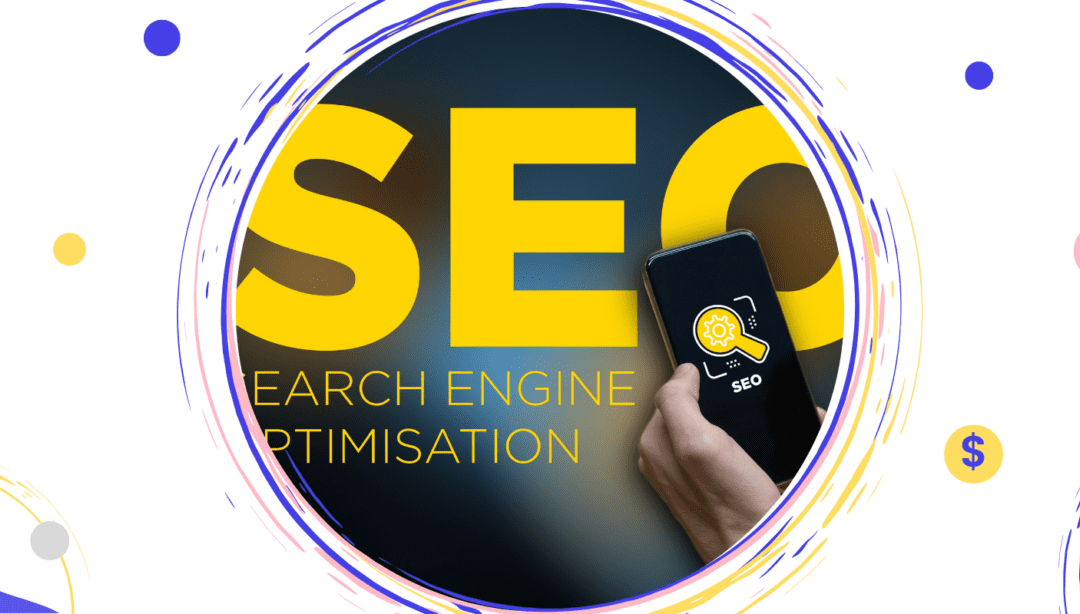You developed a great game, registered a domain name, launched your website, and now, you are eager to see the results. You think about getting free traffic from search engines and about how your visitors will interact with your site and content. But the bad news is, that your website doesn’t exist for them. YET. That’s why you need to develop and implement an SEO plan.
This is true for every business aiming to have an online presence and reach the right audience, regardless of the industry. And it is even more important for the gaming industry. On the one hand, because gamers are basically internet users by definition. Second, because the growth rate of the gaming industry from 2006 (USD 8 billion) to 2020 (USD 160 billion) is higher than that of all other entertainment industries. In one of our previous posts, we shared with you seven SEO strategies for gaming websites that will help you rank in Search Engines Results Pages (SERPs).
Let’s quickly recap these strategies:
- optimize your website for both short- and long tail keywords
- create blog posts and video content
- use updated content as part of your SEO strategies
- think mobile
- optimize for voice search
- use gaming forums to create quality backlinks
- use social media
However, when speaking about implementing any SEO plan, the main question is: How long does it take to see the results? And this is also the most frustrating question because unfortunately, the answer is more complicated than the question. It depends.
Indeed, truth to be told, SEO is a really long-term game. It’s not like paid media where you see the results (almost) when you start an advertising campaign. The winners of the SEO game are those who work patiently, continuously, and methodically to improve their websites.
While you, as a gaming developer understandably want a definitive solution and timeline, there is simply no way to provide one due to all the variables involved. So, let’s break it down.
What does SEO success look like?
Before answering this question, you first need to understand what SEO success is to ensure that your performance metrics are clear.
And when thinking about developing and implementing an SEO strategy, you should consider both campaign goals and KPIs.
- Goals are the end outcome you want to achieve. For example, your goal is to achieve a certain increase in your revenue/sales/downloads for your games over 12 months.
- KPIs (Key Performance Indicators) are metrics that demonstrate the progress you made toward your goals. For example, some of the most common SEO KPIs are organic traffic, impressions, visibility, and rankings.
We have to mention that setting goals mean setting measurable yet realistic targets. You can’t expect to rank on the #1 page of Google in a few weeks after launching your website or publishing a blog post.
In fact,
You should expect to see SEO results within 6 to 12 months
Realistically speaking. You should see SEO results within 6 to 2 months. By results, we mean a significant increase in traffic and the associated conversion or the number of leads. You don’t necessarily mean you completely achieve your goal(s) by this moment. But if you consistently invest in your SEO efforts, you should see some results in this timeframe.
You should also know that SEO takes time because Google (and also the other search engines) Intent to show the best results that fit the users’ Search Intent (according to their inquiries). And this takes time, especially when your website is new. But if you develop and implement the right SEO plan, you should be able to see results that justify your SEO efforts and investment.
Factors that affect your SEO
As mentioned before, there are a lot of elements that affect your website.
Your website’s history
Whether you have a startup and you’re working on a new website or want to improve an old one, your website’s history is one of the core factors influencing the needed time to see SEO results. A new domain (and website) will automatically take longer to rank in SERPs than an established one because it doesn’t have yet any authority and earned backlinks. On the other side, an established domain usually has at least some level of authority and at least a few backlinks pointing to it.
A brand-new website should expect to see results within 9 to 12 months from the beginning of implementing the SEO plan, rather than 6 to 12.
Competition
When optimizing your website for local or for lower-competition keywords, the chances are to get promising results much faster than when choosing the highly competitive ones. Usually, 3 to 6 months.
When setting your keywords, you must use one of the multiple SEO Keyword tools on the market. This way, you’ll get access to info such as Search Volume (SV), Keyword Difficulty (KD), Paid Difficulty (PD), Cost per Click (CPC), and more.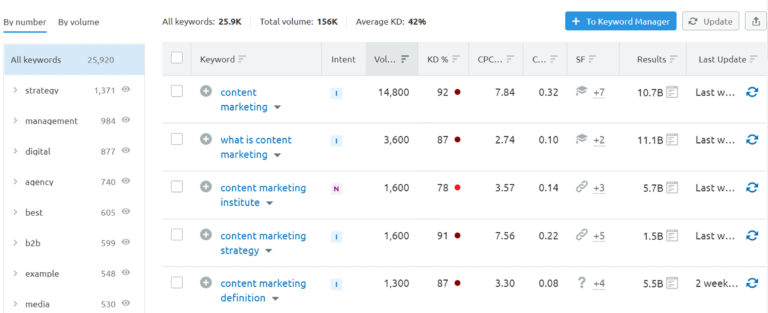
Search Volume gives you the average number of monthly searches for a given keyword over 12 months, while Keyword Difficulty shows you how hard it would be to organically rank in the top 10 for that keyword. The higher the percentage, the longer it will take to see the results.
Besides, you should check how your competitors got their position in SERPs and what they are doing to keep it.
Content
Your website’s content is also very important for your SEO plan, and the very first thing you should know is that quality matters. A lot.
Sure, according to the Backlinko study, long-form content performs better than the sort-form one. We should mention that these numbers differ according to many factors, but ultimately, the quality matter the most.
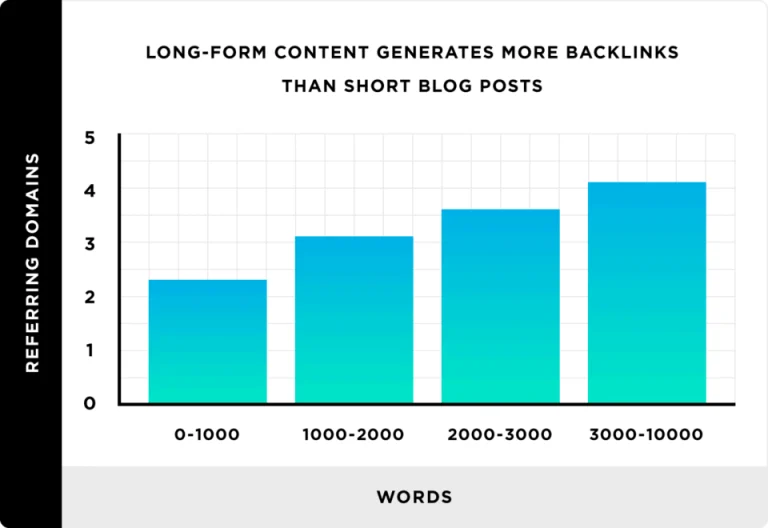
The role of backlinks in how long it takes to see the results of your SEO plan
It’s no secret that links play a huge role in SEO, but their impact on how long it takes to see significant results depends on several deeper factors.
The first is the volume of links your website receives.
Usually, the more links you get, the sooner you achieve SEO success. However, it’s not just a game of numbers, but also of relevance. Fewer high-quality links from relevant websites will have a much greater impact than a bigger volume of low-quality backlinks from irrelevant sites.
You should know that the search engines also consider the speed at which you earn links, as it is an indicator of natural or unnatural growth. And if you are trying to manipuöate ranking, you could face a penalty.
Let’s compare the three graphics:
The first looks natural:
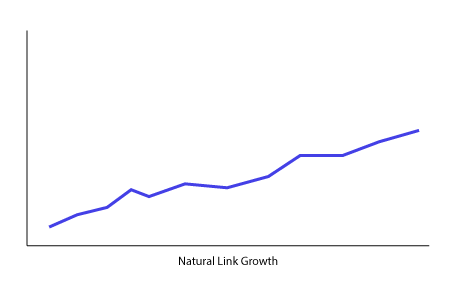
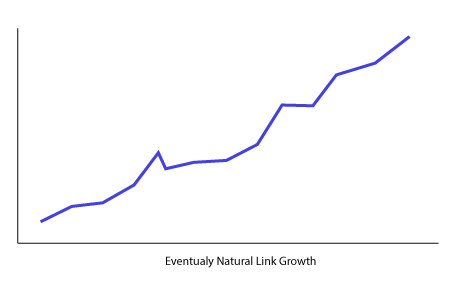
This looks completely unnatural:
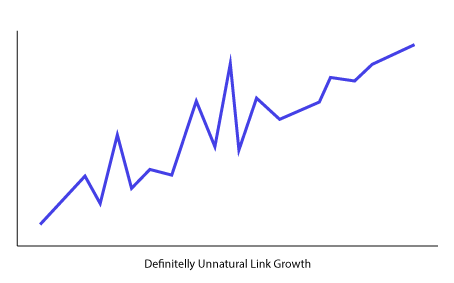
So, generally, the faster you can earn relevant, high-quality links, the faster you will rank.
How long does it take to see the results of your SEO plan?
As mentioned before, it depends on many factors. Some of them are previously listed. Besides, you should know that even when two websites are launched at the same time, in the same industry, and compete for the same audience, they will still have different rankings.
However, here is a realistic scenario of what your SEO efforts might look like during the first few months, and the results you could expect.
SEO plan, phase 1: Research, analysis, and strategy
Your SEO strategy must be based on realistic data, so you have to pay special attention to the research stage. This includes a general analysis of your competitors and the keywords they rank for, the short- and long-tail keywords used by your target audience in their queries, and possibly their synonyms. The gathered data should result in setting the core keywords you want to rank for.
If your website is not new, then you should also perform a technical audit.
With all this data you should be able to develop an SEO strategy and a monthly SEO plan

SEO plan, phase 2: the beginning of the SEO optimization and content strategy
The second stage consists in developing an SEO and content strategy and starting working on technical SEO. In case you act internationally, check out our effective international SEO strategy. Here, the localization of marketing content and multilingual SEO is paramount.
The last one means making the site modifications based on the technical audit. In addition, you should start working on the link profile and developing a content strategy, as well as a social media strategy, paid ads, or other methods to promote your content.

SEO plan, phase 3: implementing the SEO and content strategy, analyzing the results, and making the adjustments
Starting with this stage (3rd or fourth month), you should focus on content creation. Blogging, FAQs, white papers, articles, expanded product and company information, etc. – are just a part of your content.
However, you need to optimize them according to the keywords you set and to the off-page and on-page SEO best practices. You also need to continue working on the technical optimization of the website and developing a healthy link profile (which may include cleaning up low-quality links)
Starting by the fourth month or fifth month, you could expect to see a significant increase in traffic, ranking, and lead generation. Obviously, you won’t get yet the planned results, but they should be significant enough to know that you are on the right track.
It’s also the right time to start implementing the social media strategy you developed. It will help you promote your content and increase direct traffic to your website if you focus your efforts on the right platforms. This results in a natural and healthy link profile and will generate leads by itself.
However, when having enough visitors monthly, you could add conversion rate optimization to your efforts. This way, you’ll convert more visitors to your website into leads and/or sales.
Don’t forget to analyze the results of implementing your strategies and SEO plan and adjust your actions when needed.

Final words
Many SEO companies will tell you that it takes four to six months to see the results of your SEO efforts. However, keep in mind that this is the beginning. Whatever results you see in the first six months, they’ll be much less than in 12 months.
Therefore, it’s important not to stop too soon (when you see the first positive changes). Keep in your mind that SEO is a long-term game that requires time and money. You can’t budget it just for 6 to 12 months, it’s better to invest that money in something else. But when done correctly, implementing the SEO plan is a digital marketing tactic with one of the best ROI.
Speaking of games, check out our Top 10 Gaming App Store Optimization (ASO) Best Practices.

